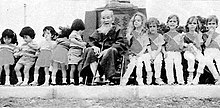Shigechiyo Izumi
Shigechiyo Izumi | |
|---|---|
泉 重千代 | |
 Shigechiyo Izumi with a group of children | |
| Born | 20 August 1865 (or 1880) |
| Died | 21 February 1986 (aged either 120 years, 185 days or 105 years, 185 days) Isen, Ōshima District, Kagoshima, Japan |
| Known for | Claimed longevity |
Shigechiyo Izumi (泉 重千代, Izumi Shigechiyo, born 20 August 1865/1880 - died 21 February 1986) was a Japanese centenarian who was titled the oldest living person after the death of Niwa Kawamoto on 16 November 1976, also from Japan. His case was initially verified by Guinness World Records, who titled him the oldest man ever, but Guinness later withdrew their claim; in the 2012 edition Christian Mortensen was named the "oldest verified man ever" and Izumi was not mentioned.[1]
Biography[]
Shigechiyo's parents died when he was 6 months old, and he was adopted by his grandfather Katsuzumi Izumi in February 1866.[citation needed] Guinness World Records found a document attesting that he was 24 years old in 1889 when he was exempted from military service to deal with sugar cane fields.[citation needed]
Izumi drank brown sugar shōchū (a Japanese alcoholic beverage often distilled from barley or rice), and took up smoking at age 70.[2][failed verification] Izumi's personal physician strongly advised him against drinking shōchū as his kidneys were not strong enough to process shōchū in his advanced age, but Izumi went on to say: "Without shōchū there would be no pleasure in life. I would rather die than give up drinking."[3] He retired from sugar cane farming in 1970.[2]
Death and uncertainty over age[]
After a brief hospitalization, Izumi died of pneumonia[4] at 21:15 JST on 21 February 1986. He was one of only two people (the other being Jeanne Calment) verified to have lived past their 120th birthday, although subsequent research has discounted this claim. In April 1987, 14 months after Izumi's death, the Department of Epidemiology at the Tokyo Metropolitan Institute of Gerontology reported that research into Izumi's family registration records indicated he might have been 105 when he died.[5][6] The 2011 Guinness World Records book states that the birth certificate submitted as evidence might have actually belonged to his older brother, who died at a young age, and the family may have re-used "Shigechiyo" as a necronym.[7]
With the closing of the "Guinness World Record Museum" in Niagara Falls, ON in September 2020, the display and reproduction of Izumi now resides in a private collection in Canada.
The oldest undisputed case of male longevity is Jiroemon Kimura, also from Japan, who died at age 116 years and 54 days.[8]
See also[]
References[]
- ^ Guinness World Records. Bantam Books. 27 March 2012. p. 86. ISBN 0-345-53437-9. Retrieved 20 February 2020.
- ^ Jump up to: a b The Guinness Book of Records (1993 ed.). Bantam Books. October 1992. p. 355. ISBN 0-553-56257-6. Retrieved 20 February 2020.
- ^ "Secrets of the oldest man in the world". The Moscow News. Archived from the original on 2007-03-10. Retrieved 2007-01-01.
- ^ The Guinness Book of Records (1999 ed.). Guinness Records. September 1998. p. 102. ISBN 0-965-23839-3. Retrieved 20 February 2020.
- ^ Asahi News Service, APRIL 6, 1987, MONDAY, JAPANESE EXPERT DEBUNKS IDEA OF 'VILLAGE OF 100-YEAR-OLDS'
- ^ "The Shigechiyo Izumi Case". Supercentenarian.com. 6 April 1987. Retrieved 20 August 2011.
- ^ "Men Supercentenarian Photos File No. 1 of 3 for the years 2001-2008". Genealogy Research Group. 11 September 2012. Retrieved 20 February 2020.
- ^ Matsuyama, Kanoko (June 12, 2013). "Oldest man in history dies at age 116". Sydney Morning Herald. Retrieved 12 June 2013.
- 1986 deaths
- Deaths from pneumonia
- Infectious disease deaths in Japan
- People from the Amami Islands
- Japanese centenarians
- Men centenarians
- Longevity claims